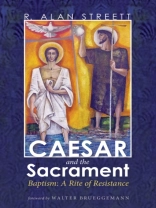When the earliest Christ-followers were baptized they participated in a politically subversive act. Rejecting the Empire’s claim that it had a divine right to rule the world, they pledged their allegiance to a kingdom other than Rome and a king other than Caesar (Acts 17:7).
Many books explore baptism from doctrinal or theological perspectives, and focus on issues such as the correct mode of baptism, the proper candidate for baptism, who has the authority to baptize, and whether or not baptism is a symbol or means of grace. By contrast, Caesar and the Sacrament investigates the political nature of baptism.
Very few contemporary Christians consider baptism’s original purpose or political significance. Only by studying baptism in its historical context, can we discover its impact on first-century believers and the adverse reaction it engendered among Roman and Jewish officials. Since baptism was initially a rite of non-violent resistance, what should its function be today?
Sobre o autor
Walter Brueggemann is William Marcellus Mc Pheeters Professor of Old Testament Emeritus at Columbia Theological Seminary, Decatur, Georgia. He is past President of the Society of Biblical Literature and the author of several books from Cascade Books, including: A Pathway of Interpretation, David and His Theologian, Divine Presence amid Violence, Praying the Psalms (2nd ed.), and The Role of Old Testament Theology in Old Testament Interpretation.(2011), Remember You Are Dust (2012), Embracing the Transformation (2013), and The Practice of Homefulness (2014).







![Capa do Brian Schrag & Julisa Rowe: Community Arts for God's Purposes [Chinese] 貼近神心意的社群藝術 Capa do Brian Schrag & Julisa Rowe: Community Arts for God's Purposes [Chinese] 貼近神心意的社群藝術](https://static.worldofdigitals.com/thumb_webp/740/9781645083740.webp)




